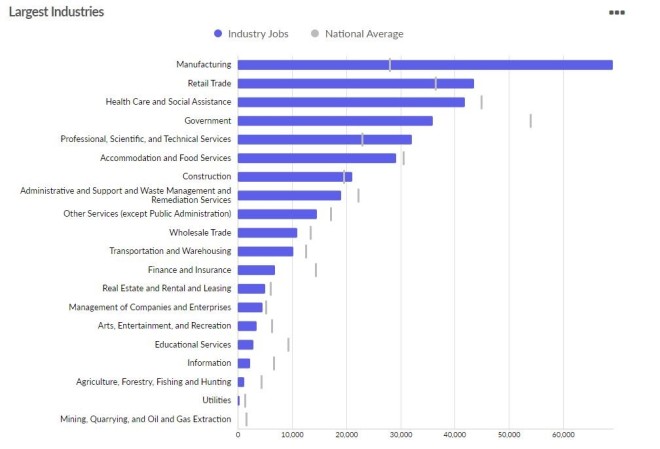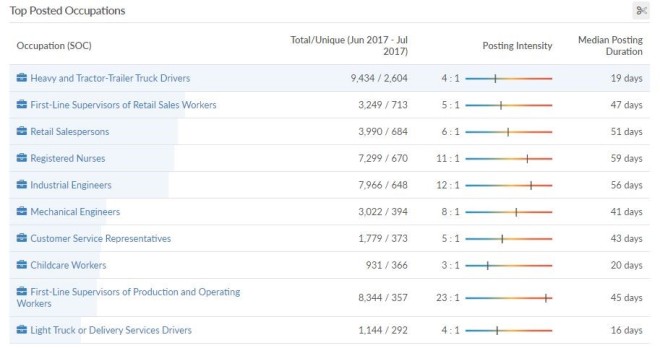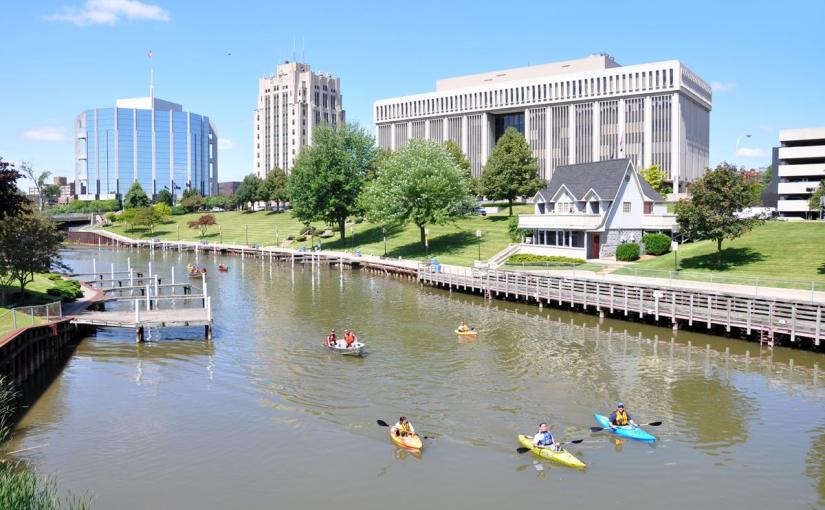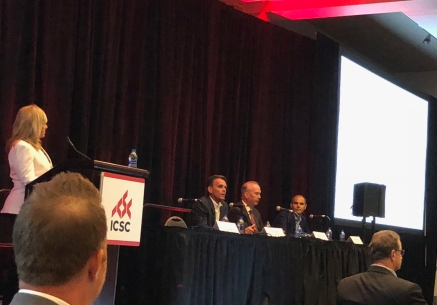Spanning across terms of presidents, governors and a transition to an executive form of government, Macomb County’s economy continues to shine, adding new jobs and higher wages for nine straight years.
Macomb County’s population is currently 871,375. For perspective, this is bigger than 5 U.S. states and larger than major U.S. cities like Seattle, Washington D.C., Atlanta, Boston and Miami. What some may describe as “just a suburb of Detroit” is actually an economic powerhouse.
Having an economy as large as Macomb’s and growing it consistently and strongly over a long period of time requires careful planning from the Macomb County Department of Planning and Economic Development. Our region’s success is due in part to our team’s ability to help existing companies grow, attract companies from outside our region and create an environment that is favorable for starting a business.
How we measure progress
When we say that Macomb County’s economy is strong and that there has been nine straight years of growth, what does that actually mean? Well, there are several key barometers that can measure economic health. One indicator – if you weren’t working before and are now, that is progress. Another – if you were working before, but make more money now, that is also progress. There are other signs too – for instance, how easy is it to find a job?
To talk about the growth in the county requires starting from the lowest point in the recession. By the numbers, the county’s economy officially bottomed out in June of 2009, when our unemployment was a staggering 18.3 percent. Nearly one out of five people could not find a job and there were 78,498 people unemployed. To put that another way, the county had a labor force that was 429,356 strong, but only 350,858 people were employed. For those who had jobs, wages were falling and the inflation rate was negative. The two largest employers in the largest industry in the county were in bankruptcy (General Motors & Chrysler), and a national financial crisis was wreaking havoc across all of the other industries. The future was bleak.
Looking at today’s numbers: unemployment in Macomb County for May of 2018 is at 3.5 percent. There are 424,851 people working and only 15,272 people are unemployed. These numbers represent a growth of 73,993 new jobs. For scale, that amounts to a new job for every single person at a sold out Comerica Park, Little Ceasars Arena, Jimmy John’s Field and Freedom Hill. Combined. In only nine years.
Wages in the county are rising as well. In 2009, the average weekly take-home wage across all private sector professions was $853. In 2017 (2018 data is not out yet!) average wages have grown a very robust 22 percent to $1,045 per week.
Since the peak of the recession in 2009, the county has experienced nine straight years of job growth. Nearly 75,000 more people are working, and while that number looks great on paper, it also means 75,000 more families and households can sleep better at night worrying less about making mortgage payments and putting food on the table.
This growth in wages and in the number of new jobs is having an extremely profound impact on the spending power in the county. Total countywide wages in 2009 were $10,325,458,011 ($10.3 billion!). In 2017, that number grew more than 50 percent to a total of $15,915,245,824 ($15.9 billion!). This is fantastic news for those of us looking to spend money and for those of us in the business of selling goods and services.
While 2009 may seem like a distant past – the fact that we emerged is an accomplishment to be celebrated.
A deeper dive into key industries
Economic development may be a voodoo pseudo-science to some, but in Macomb County data drives the decision making. Looking at the economy through the data already mentioned and through deeper metrics like location quotients, we can identify nine targeted industries as the driving industries in the county.
These industries are selected on their power to not only spur growth in their sectors, but to also drive growth across industry borders. They represent some of the highest wages and earnings potential in the county. They also represent the future for our workforce. For instance:
- The number of jobs in the IT and Cybersecurity fields within the county has more than doubled since 2010.
- Since 2009, Macomb County has nearly doubled its number of Professional Services workers, growing from 12,000 to 23,000. This is triple the state average and more than six times the nation’s rate of growth!
- Manufacturing jobs continue to be the foundation of the county’s economy and are some of the most lucrative career opportunities available.
- Because of our manufacturing superiority and strategic location near a major international border in the Midwest, logistics and warehousing – the industry of storing and moving goods – is also a major economic sector within the county.

Right now, there are more than 20,000 unique jobs available in the county. Anyone looking for work can connect with these jobs by going to the Michigan Talent Bank. They may also seek career counseling or assistance by reaching out to a local Michigan Works! office.

For the full details, check out the reports on each of these industries on the county’s website.
Why this matters
The perks of becoming employed after a period of unemployment, or getting a raise, are obvious. However, even if your job or salary have not changed, you are benefiting from this stronger Macomb County economy. The community benefits gained by a healthy economy are massive. Tangible effects include:
- Reduction in poverty. With fewer people unemployed and wages rising, there are fewer people living in poverty. Less people in poverty is obviously a good thing. Whether you’re feeling the direct impact (as a person formerly of poverty that no longer lives in poverty) or enjoying the social impacts of lower poverty – lower crime, less blight, fewer foreclosures – the benefits to the community are very real.
- Improved public services. As more of us earn wages, and as our collective average wages grow, state and local governments are seeing their bottom lines improve. For instance, Macomb County’s economic growth is leading to higher tax revenues. This allows the government to provide better services that lead to a higher quality of life – such as improving parks and offering more services in the community. It also helps the government invest in our economy – with funding for schools and roads. (BONUS perk: As government fiscal health continues to rebound, issuing bonds to pay for these services becomes even cheaper, allowing for even more to get done!)
Looking Ahead
Macomb County is on solid ground. Looking ahead to the future, regardless of where you shop for groceries (a term coined by Macomb County Planning and Economic Development Director John Paul Rea on finding sources of economic data) the future is bright. Macomb County can, at least for the foreseeable future, expect continued job and wage growth.
The county is also undertaking a massive effort to make sure that it is ready for jobs of the future. Current estimates say that that 85 percent of the jobs that will exist in 2030 haven’t even been invented yet. And of course, these jobs will need candidates with advanced skill sets. Macomb County is prepping hard for this. With facilities such as Macomb Community College and its M-TEC program, Wayne State’s Advanced Technology Education Center and Romeo’s Ford Next Generation Learning facility, and with groups like MADCAT preparing folks for cyber careers, and with events such as Manufacturing Day – the future in the county is extremely bright.
How this can benefit you
Are you a company in Macomb County? Now is a great time to reach out to our department. We have a team of experts that can offer free and confidential services to connect your company with the resources you need to grow. Our team can help incentivize growth in your physical space, connect you with hiring resources and access to workforce development and provide business development solutions. Our toolbox is sharp and honed by the dozens of service partners we work closely with to make sure your business has what it needs.
Are you someone looking for a job or to advance in your career? Companies in Macomb County right now are competing hard to find you. We can pair you with the job opportunities that are on the market right now or help connect you with the training to take your career to the next level. If you have been on the fence about taking the next step – now is absolutely the right time to do so.
Nick Posavetz is an economic development specialist for the Macomb County Department of Planning & Economic Development and is focused on growing, retaining and attracting businesses to Macomb County. To learn what resources are available for your business, reach out to the department at info@macombbusiness.com or 586-469-5285.


 company was attracted to the area for those exact reasons and opened its Shelby Township facility in 1998, bringing more than 250 years of experience with it. A family-owned organization, Möllertech has plants all over the world and three in the United States that specialize in vehicle interiors. At the 110,000-square-foot Michigan facility, parts are made for General Motors and BMW by 75 individuals – an employee count that will likely increase due to new projects on the horizon. But this month, the focus at Möllertech has been the celebration of its 20 year anniversary here in Macomb County; a milestone recently recognized with an open house and BBQ.
company was attracted to the area for those exact reasons and opened its Shelby Township facility in 1998, bringing more than 250 years of experience with it. A family-owned organization, Möllertech has plants all over the world and three in the United States that specialize in vehicle interiors. At the 110,000-square-foot Michigan facility, parts are made for General Motors and BMW by 75 individuals – an employee count that will likely increase due to new projects on the horizon. But this month, the focus at Möllertech has been the celebration of its 20 year anniversary here in Macomb County; a milestone recently recognized with an open house and BBQ.





 This is why the Macomb-OU Incubator at the Velocity Center is hosting “Starting Up,” a workshop that is free and open to the public. The course, held Tuesday, August 21 from 9:30 a.m. to 11 a.m., is suitable for:
This is why the Macomb-OU Incubator at the Velocity Center is hosting “Starting Up,” a workshop that is free and open to the public. The course, held Tuesday, August 21 from 9:30 a.m. to 11 a.m., is suitable for:

 “In 2016, more than 100 business and community leaders gathered to learn how we could work together to fix the mess that is Mound Road,” said County Executive Mark Hackel. “Together, we educated ourselves about how to transform this critical corridor and to advocate for change. Our efforts enabled us to receive funding that will not only completely rebuild the road, but also equip it with a smart infrastructure network while improving traffic flow, sidewalks, pedestrian bridges and wayfinding. When it’s complete, Mound Road will be a shining example of the future of our roads nationwide. It will go from the worst stretch of road to one that will be recognized around the nation.”
“In 2016, more than 100 business and community leaders gathered to learn how we could work together to fix the mess that is Mound Road,” said County Executive Mark Hackel. “Together, we educated ourselves about how to transform this critical corridor and to advocate for change. Our efforts enabled us to receive funding that will not only completely rebuild the road, but also equip it with a smart infrastructure network while improving traffic flow, sidewalks, pedestrian bridges and wayfinding. When it’s complete, Mound Road will be a shining example of the future of our roads nationwide. It will go from the worst stretch of road to one that will be recognized around the nation.”


 positive and happy coming into work and their clients, which include Randazzo Fresh Market, Roura, L&L Products, the Detroit Free Press Marathon and Hitachi, are impressed by the atmosphere. Most importantly however, the space will allow them to become further engaged in the area. Jimi, Adam and Momentum as a whole feel strongly about giving back to the community. Whether that means committing to pro bono projects or speaking to local schools about internet safety, the organization is ready and willing to get involved in Utica. And you could certainly feel that spirit at the official grand opening for Momentum on Thursday, July 19. I attended the open house with several co-workers and was moved by the vibrant and celebratory atmosphere and community-oriented activities. Everyone attending the event was excited about the next chapter for the company, including Momentum’s very first client, the Michigan Head and Neck Institute, who spoke to the crowd about their work with the firm and how they have continued on with them for several years now. Thrilled with the services delivered, they have no intention of taking their business elsewhere. This certainly helps Jimi and Adam work towards the goal they established back in 2010: “Be a recognized, global leader in cutting edge web technology and online marketing.” Now with an expanding team, 200 active clients and over 30 percent growth in 2017, you could certainly say Momentum is well on its way to achieving this objective.
positive and happy coming into work and their clients, which include Randazzo Fresh Market, Roura, L&L Products, the Detroit Free Press Marathon and Hitachi, are impressed by the atmosphere. Most importantly however, the space will allow them to become further engaged in the area. Jimi, Adam and Momentum as a whole feel strongly about giving back to the community. Whether that means committing to pro bono projects or speaking to local schools about internet safety, the organization is ready and willing to get involved in Utica. And you could certainly feel that spirit at the official grand opening for Momentum on Thursday, July 19. I attended the open house with several co-workers and was moved by the vibrant and celebratory atmosphere and community-oriented activities. Everyone attending the event was excited about the next chapter for the company, including Momentum’s very first client, the Michigan Head and Neck Institute, who spoke to the crowd about their work with the firm and how they have continued on with them for several years now. Thrilled with the services delivered, they have no intention of taking their business elsewhere. This certainly helps Jimi and Adam work towards the goal they established back in 2010: “Be a recognized, global leader in cutting edge web technology and online marketing.” Now with an expanding team, 200 active clients and over 30 percent growth in 2017, you could certainly say Momentum is well on its way to achieving this objective.
 main topics of discussion during the Michigan Idea Exchange on Thursday, July 12. Held at Cobo Center by the International Council of Shopping Centers, the event provided an opportunity for local governments to speak to individuals in the real estate industry and for those individuals to share ideas, ask questions and network.
main topics of discussion during the Michigan Idea Exchange on Thursday, July 12. Held at Cobo Center by the International Council of Shopping Centers, the event provided an opportunity for local governments to speak to individuals in the real estate industry and for those individuals to share ideas, ask questions and network.

 Ninety-five percent of the businesses in Macomb County are defined as a small business, one that employs fewer than 50 people. Because of this, the Macomb County Department of Planning and Economic Development (MCPED) works closely with the Michigan Small Business Development Center (SBDC) to offer owners and entrepreneurs assistance with marketing, financial analysis and planning, strategic planning, management and operations. We act as their partner, helping them succeed.
Ninety-five percent of the businesses in Macomb County are defined as a small business, one that employs fewer than 50 people. Because of this, the Macomb County Department of Planning and Economic Development (MCPED) works closely with the Michigan Small Business Development Center (SBDC) to offer owners and entrepreneurs assistance with marketing, financial analysis and planning, strategic planning, management and operations. We act as their partner, helping them succeed.


